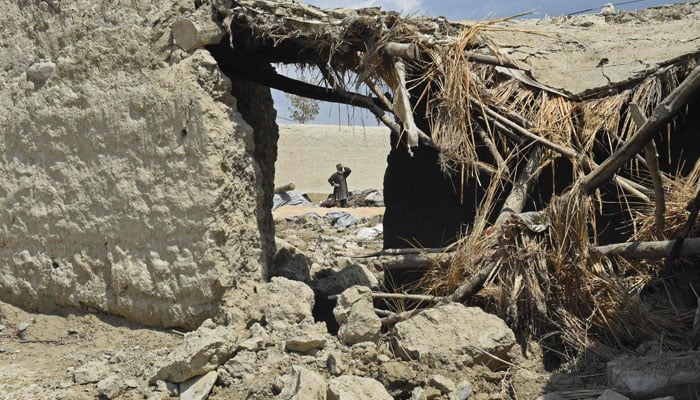Why climate change hit Balochistan the hardest
After years of less rainfall and subsequent droughts in Balochistan, abrupt rainfall flooded away all infrastructure that was being installed, writes Qasim Khan
August 01, 2022

Thousands of people in Balochistan have lost their loved ones, homes and belongings to floods caused by heavy rains in the province. Social media is rife with heart-wrenching visuals where people can be seen taking dead bodies out of water. It is shocking that during this terrible situation, where helpless people drowned to death, the provincial government remained oblivious to people’s suffering.
The Provincial Disaster Management Authority (PDMA) has claimed that over 100 people in the province have lost their lives, more than 6,000 houses have been damaged, and 3,000 houses have been completely destroyed by the flash floods since June 1. Addressing a press conference on July 28, Chief Secretary Balochistan Abdul Aziz Uqaili said, “thousands of people have been injured and around 50,000 people have been affected. Besides, around 200,000 acres of land has also been affected.”
It is important to note that these are only the reported figures, and the actual figures in the underreported areas in the peripheries are obviously higher, as evident by the circumstantial evidence shared by the locals.
While it is true that this year’s monsoon rains have broken the 30-year average, it is unfortunate that the Balochistan government could not devise a substantial plan to counter the destruction caused by the floods at the earliest and save the lives of the poor living in mud houses in both rural and urban areas. Despite knowing the possibility of heavy rainfall weeks before, the authorities come into action only after floods drowned hundreds of people and swept away thousands of houses.
Like other parts of the country, Balochistan has been devastatingly impacted by climate change in the last few years. After years of less rainfall and subsequent droughts in the province, abrupt rainfall flooded away all the infrastructure that was being installed in the natural route of water flow.
But the rain could not have caused such a large-scale disaster had the province had properly developed infrastructure. Many small dams and reservoirs broke out after being filled to their maximum capacity, washing out the population around. Some are on the verge of breaking apart, putting the lives of more people at risk. A majority of dams in the province are either poorly constructed or ill-designed, lacking proper structure.
In urban areas, a lack of proper drainage systems led to the overflow of drains and flooded cities. Many shopkeepers incurred financial losses when rain water flowed into their shops and damaged inventory. Also, many bridges and roads have been swept away by the overflow of water, which is an indication of the provincial government’s poor infrastructure-related development programmes.
Besides the government’s negligence, it is quite unfortunate to say that mainstream media could not give due coverage to the ongoing floods in the province. People were rendered homeless, sleeping under an open sky with nothing to eat, but the electronic media was busy discussing the never-ending political circus. It failed to raise the issue on time so that lives could have been saved on time.
Apart from the provincial government’s incompetence, it also lacks the capacity to tackle such a huge calamity. So, it is apparently beyond its capability to reach out to affected people in far-off regions in a situation where communication networks are overflowed by the floods.
Keeping in view the seriousness of the situation, the federal government should extend support to the people of Balochistan and work in collaboration with the provincial government and other non-governmental organizations to keep people save from further disaster.
The provincial government should also consider installing proper sanitation systems in urban areas and developing an all-time weather-friendly infrastructure across the province. It must take steps to provide relief in terms of food and shelter and financial assistance to all affected people.
The writer is a political analyst. He tweets @khanzqasim
Originally published in The News











